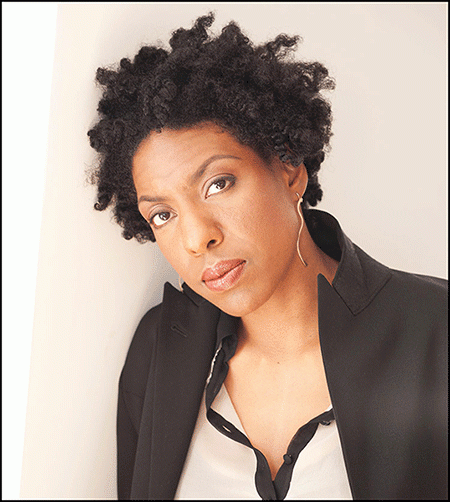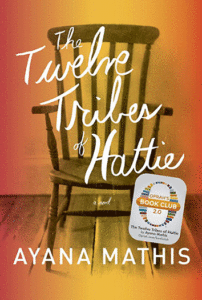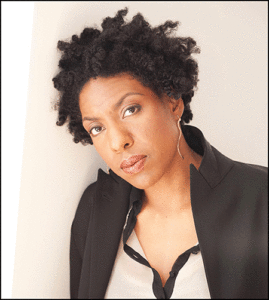
- March 3 Light reception 2:30 - 3 p.m. JSMA Ford Lecture Hall
- March Panel with : 3:00 - 4:30 p.m. JSMA Ford Lecture Hall
- March 3 Keynote talk with : 6 - 8 p.m. Downtown Eugene Public Library
6th annual CSWS Northwest Women Writers Symposium
“Women and Work: Stories of the Great Migration”
printable flyer PDFThe acclaimed, bestselling author will deliver a keynote lecture and participate in a panel discussion focused on her celebrated novel The Twelve Tribes of Hattie, at the 6th annual CSWS Northwest Women Writers Symposium, “Women and Work: Women’s Stories of Work and the Great Migration.”
Mathis’s debut novel, The Twelve Tribes of Hattie, was a New York Times Bestseller, a 2013 New York Times Notable Book of the Year, a Boston Globe Best Book of the Year, and an NPR Best Books of 2013. This novel was long-listed for the IMPAC Dublin International Literary Award, nominated for a 2013 Hurston/Wright Legacy Award, and was chosen by Oprah Winfrey as the second selection for Oprah’s Book Club 2.0. Mathis teaches at the Iowa Writers' Workshop.
March 3 Keynote talk: “The Twelve Tribes of Hattie,” with 6 - 8 p.m. Downtown Eugene Public Library, 100 W. 10th (10th & Olive), Eugene, OR 97401
will deliver a keynote talk, offer a Q&A session, and sign books.
 March 3 Panel with : 3:00 - 4:30 p.m.
Jordan Schnitzer Museum of Art (JSMA), Ford Lecture Hall, 1430 Johnson Lane, UO campus
(Light reception: 2:30 - 3 p.m.)
March 3 Panel with : 3:00 - 4:30 p.m.
Jordan Schnitzer Museum of Art (JSMA), Ford Lecture Hall, 1430 Johnson Lane, UO campus
(Light reception: 2:30 - 3 p.m.)
“The Twelve Tribes of Hattie”—This panel will focus on the Great Migration and the work of women through the lens of ’s novel The Twelve Tribes of Hattie. The panel will feature Mathis reading portions of her novel, with comments by community educators and University of Oregon faculty.
Panelists include:
-
Marjorie Celona, UO Creative Writing Program, is a graduate of the Iowa Writers’ Workshop and the author of Y: A Novel (winner of France’s Grand Prix Littéraire de l’Héroïne for Best Foreign Novel).
- Sharon Luk, UO Department of English, teaches courses in African American Literature and Asian American Literature and studies in race and ethnicity.
- Mo Young, Equity and Access Coordinator, Lane County
- Moderator: Michelle McKinley, Director, CSWS; Bernard B. Kliks Associate Professor, School of Law
From the Lyceum Agency: “The Twelve Tribes of Hattie is the multi-generational story of one family, part of the Great Migration of African-Americans who left the South to escape hatred and oppression and seek opportunity in the North. An intimate portrait captured in twelve luminous narrative threads, The Twelve Tribes of Hattie opens in 1923, when fifteen-year-old Hattie Shepherd flees Georgia and settles in Philadelphia, hoping for a chance at a better life. Instead, she marries a man who will bring her nothing but disappointment and watches helplessly as her firstborn twins succumb to an illness a few pennies could have prevented. Hattie gives birth to nine more children whom she raises with grit and mettle and not an ounce of the tenderness they crave. That lack of love, as well as other travails, causes suffering to ripple through the generations.
“Isabel Wilkerson, writing in The New York Times, concludes that though the Great Migration forms the backdrop for the plot, The Twelve Tribes of Hattie is really the story of ‘a mother’s loss and the toll it takes on her and her children, their feeble attempts to escape their lives and the costs borne by every one of them.’”
Hosted by the Center for the Study of Women in Society at the University of Oregon in cooperation with Eugene Pubic Library, this symposium is generously cosponsored by Oregon Humanities Center’s Endowment for Public Outreach in the Arts, Sciences, and Humanities; UO Libraries; Creative Writing Program; Departments of English and Ethnic Studies; the Jordan Schnitzer Museum of Art; and the Comparative Literature journal.




